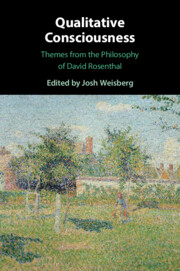Book contents
- Qualitative Consciousness
- Qualitative Consciousness
- Copyright page
- Dedication
- Contents
- Contributors
- Introduction
- Part I Consciousness
- Part II Qualities
- Part III Higher-Order Thought
- Chapter 10 A Challenge:
- Chapter 11 Being Self-Involved without Thinking about It
- Chapter 12 Higher-Order Thought Theory Meets Phenomenal Intentionality Theory
- Chapter 13 Controlling Phenomenology by Being Unaware of Intentions
- Chapter 14 Mental Appearance and Mental Reality
- References
- Bibliography of Rosenthal’s Works
- Index
Chapter 10 - A Challenge:
Can Self-Monitoring Be Achieved without Consciousness?*
from Part III - Higher-Order Thought
Published online by Cambridge University Press: 06 October 2022
- Qualitative Consciousness
- Qualitative Consciousness
- Copyright page
- Dedication
- Contents
- Contributors
- Introduction
- Part I Consciousness
- Part II Qualities
- Part III Higher-Order Thought
- Chapter 10 A Challenge:
- Chapter 11 Being Self-Involved without Thinking about It
- Chapter 12 Higher-Order Thought Theory Meets Phenomenal Intentionality Theory
- Chapter 13 Controlling Phenomenology by Being Unaware of Intentions
- Chapter 14 Mental Appearance and Mental Reality
- References
- Bibliography of Rosenthal’s Works
- Index
Summary
Qualitative consciousness is conscious experience marked by the presence of sensory qualities, like the experienced painfulness of having a piano dropped on your foot or the consciousness of seeing the brilliant reds and oranges of a sunset. Over his career, philosopher David Rosenthal has defended an influential theoretical approach to explaining qualitative consciousness. This approach involves the development of two theories – the higher-order thought theory of mental state consciousness and the quality-space theory of sensory quality. If the problem of explaining qualitative consciousness is divided into two more manageable pieces, the door opens to a satisfying explanation of what is seen by some to be an intractable explanatory puzzle. This interdisciplinary collection develops, criticizes, and expands upon themes inspired by Rosenthal’s work. The result is an exciting collection of new essays by philosophers and scientists, which will be of interest to all those engaged in consciousness studies.
- Type
- Chapter
- Information
- Qualitative ConsciousnessThemes from the Philosophy of David Rosenthal, pp. 181 - 187Publisher: Cambridge University PressPrint publication year: 2022

